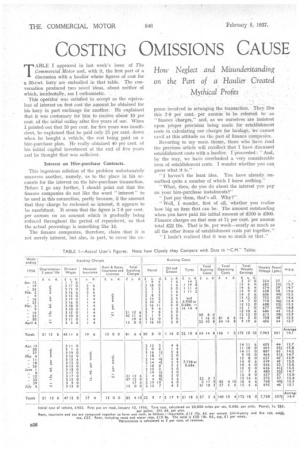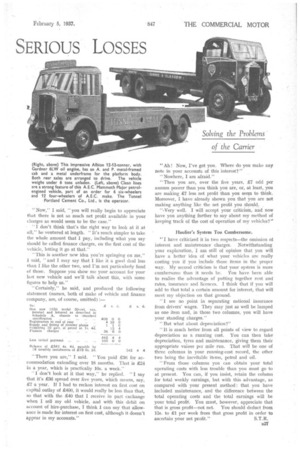COSTING OMISSIONS CAUSE SERIOUS LOSSES
Page 40

Page 41

If you've noticed an error in this article please click here to report it so we can fix it.
How Neglect and Misunderstanding on the Part of a Haulier Created Mythical Profits
TABLE I appeared in last week's issue of The Commercial Motor and, with it, the first part of a discussion with a haulier whose figures of cost for a 30-cwt. lorry are embodied in that table. The conversation produced two novel ideas, about neither of which, incidentally, am I enthusiastic.
This operator was satisfied to accept as the equivalent of interest on first cost the amount he obtained for his lorry in part exchange for another. He explained that it was customary for him to receive about 10 per cent, of the initial outlay after five years of use. When I pointed out that 10 per cent. for five years was insufficient, he explained that he paid only 25 per cent. down when he bought a vehicle, the rest being paid on a hire-purchase plan. He really obtained 40 per cent. of his initial capital investment at the end of five years and he thought that was sufficient.
interest on Hire-purchase Contracts.
This ingenious solution of the problem unfortunately uncovers another, namely, as to the place in his accounts for the interest on the hire-purchase transaction. Before I go any further, I should point out that the finance companies do not like the word "interest" to be used in this connection, partly because, if the amount that they charge be reckoned as interest, it appears to be exorbitant. It seems that the figure is 7-8 per cent. per annum on an amount which• is gradually being reduced throughout the period of repa3rffient, so that the actual percentage is something like 14.
The finance companies, therefore, claim that it is not merely interest, but also, in part, to cover the ex pense involved in arranging the ttansaction. They like this 7-8 per cent. per annum to be referred, to as " finance Charges," and, as we ourselves are insistent upon proper provision being made for establishment costs in calculating our charges for haulage,' we cannot cavil at this attitude on the part of finance companies.
Reverting to my main theme, those who have read the previous article will recollect that I have discussed establishment costs with a haulier. I proceeded: "And, by the way, we have overlooked a very considerable item of establishment costs. I wonder whether you can guess what it is."
"I haven't the least idea. You have already unearthed quite a number of which I knew nothing."
"What, then, do you do about the interest you pay on your hire-purchase instalments?"
"Just pay them, that's all. Why?"
"Well, I wonder, first of all, whether you realize how big an item that can be. The amount outstanding when you have paid the initial amount of £100 is £300. Finance charges on that sum at 74 per cent, per annum total £22 10s. That is 9s. per week-nearly as much as all the other items of establishment costs put together."
"I hadn't realized that it was so much as that." "Now," I said, "you will really begin to appreciate that there is not so much net profit available in your charges as would seem to be the case."
I don't think that's the right way to look at it at all," he ventured at length. " It's much simpler to take the whole amount that I pay, including what you say should be called finance charges, on the first cost of the vehicle, letting it go at that."
" This is another new idea you're springing on me," I said, "and I may say that I like it a good deal less than I like the other two, and I'm not particularly fond of those. Suppose you show me your account for your last new vehicle and we'll talk about this, with some figures to help us."
" Certainly," he said, and produced the following statement (names, both of make of vehicle and finance company, are, of course, omitted) :— "There you are," I said. "You paid :CM for accommodation extending over 18 months. That is 424 in a year, which is practically 10s. a week."
"I don't look at it that way," he replied. "I say that it's £36 spread over five years, which means, say, £7 a year. If I had to reckon interest on first cost on capital outlay of £400, it would really be less than that, so that with the E40 that I receive in part exchange when I sell my old vehicle, and with this debit on account of hire-purchase, I think I can say that allowance is made for interest on first cost, although it doesn't appear in my accounts." "Ali! Now, I've got you. Where do you make any note in your accounts of this interest'?"
" Nowhere, I am afraid."
"Then you are, over the five years, £7 odd per annum poorer than you think you are, or, at least, you are making £7 less net profit than you seem to think. Moreover, I have already shown you that you are not making anything like the net profit you should:
"-Very well. I will accept your criticiSm, and now have you anything further to say about my Method of keeping track of the cost of operation of my vehicles?'" Haulier's System Too Cumbersome.
"I have criticized it in two respects—the omission of interest and maintenance charges. Notwithstanding your explanation, I am still of opinion that you will have a better idea of what your vehicles are really costing you if you include those items in the proper way. My second criticism is that your system is more cumbersome than it needs be. You have been able to realize the advantage of putting together rent and rates, insurance and licences. 1 think that if you will add to that total a certain amount for interest, that will meet my objection on that ground.
" I see no point in separating national insurance from drivers' wage's. They may just as well be lumped as one item and, in those two columns, you will have your standing charges."
But what about depreciation?"
"It is much better from all points of view to regard depreciation as a running cost. You can then take depreciation, tyres and maintenance, giving them their appropriate values per mile run. That will be one of three columns in your running-cost record, the other two being the inevitable items, petrol and oil.
" From those columns you can obtain your total operating costs with less trouble than you must go to at present. You can, if you insist, retain the column for total weekly earnings, but with this advantage, as compared with your present method: that you have included maintenance, and the difference between the total operating costs and the total earnings will be your total profit. You must, however, appreciate that that is gross profit—not net. You should deduct from 15s. to £1 per week from that gross profit in order to ascertain your net profit." S.T.R.




























































































